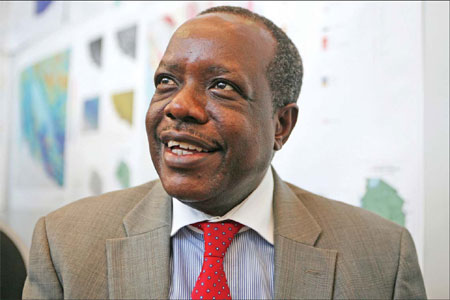Tanzania wants to power ahead
 0 Comment(s)
0 Comment(s) Print
Print E-mail China Daily, March 22, 2013
E-mail China Daily, March 22, 2013
Energy and minerals minister seeks overseas investment to realize tremendous potential
Sospeter M. Muhongo is rare among politicians in that he is an acknowledged expert on his ministerial brief.
|
|
|
Sospeter M. Muhongo says Tanzania's resources are vital for it to achieve its Vision 2025 target to become a middle-income country. [Photo: China Daily] |
The 58-year-old former president of the Geological Society of Africa was appointed last May as Tanzania's minister of energy and minerals by President Jakaya Mrisho Kikwete.
"This is the way we are going now. I think, depending on our new constitution, it is very likely that experts will be deployed in some positions if it is thought they can play roles that benefit the country," he says.
Muhongo, who was teaching at university until his appointment last year, was speaking during a break at the Mining Indaba conference in Cape Town, where he was attending to attract investment to the resources sector of the East African country.
Tanzania has strong links with China rooted in the Tanzania-Zambia Railway Authority whose famous line was completed in 1975. This, however, does not mean that investors from the world's second-largest economy will get special access or privileges.
"This is a country that gives equal opportunities to all investors. We are inviting investors from around the world. We have no problem with Chinese investment, however," he says.
Tanzania has an abundance of natural resources from gold, lead, zinc, platinum and titanium as well as coal and uranium deposits to a huge range of gemstones.
The problem is that with a GDP at $24 billion, it doesn't have the financial muscle to develop them on its own and needs external players to help.
Muhongo, who still has the air of an academic rather than a politician, says this is one of the key problems he has to address.
"That is why we are inviting investment. I think that of all the potential that we have, we have utilized only about 10 percent of our resources. We need to use more to transform the economy, to provide better medical care, better education and to eradicate poverty from Tanzania," he says.
In recent years there have been a number of Chinese investments in Tanzania's coal and iron ore industries.
Sichuan Hongda Group has recently made a $3 billion investment in the Mchuchuma coal and Liganga iron ore projects in southern Tanzania.
The Chinese have also funded through the Export-Import Bank of China a $1.22-billion 523-kilometer gas pipeline, which a Chinese construction company will build over the next 18 months.
Muhongo, who is also an honorary research fellow of the Chinese Academy of Geological Sciences, says the latter could have a transformative effect on the economy.
"It is a very big project for us. It means that we are starting to utilize our natural gas to generate power. We want to export liquefied natural gas and we are going to use the gas domestically and also for commercial use," he says.
Muhongo, who for a long time was professor of geology at the University of Dar es Salaam, says the developing country's resources is vital for it to achieve its Vision 2025 target to become a middle-income country. According to the World Bank, it had a GDP per capita income of $527 in 2010, making it one of the poorest countries in the world.
"Now for us to do that we need sustained economic growth of about 8 or 10 percent and that will mean utilizing our natural resources so that we have the natural gas and coal to generate power and electricity that will propel other sectors of the economy," he says.
Muhongo says that one of the key problems facing Tanzanian citizens is their lack of access to electricity. Currently, only 18.4 percent of the population has access but the minister intends to double that to 30 percent by 2015.







Go to Forum >>0 Comment(s)